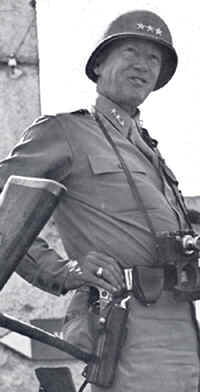George Patton was an American general in World War Two – and probably one of her most controversial. Patton found fame in the conquest of Sicily which followed on from the success of the North African campaign. It was here that George Patton found fame as a daring and unconventional military commander. Patton had known Dwight Eisenhower for many years and he received support from the Eisenhower throughout the rest of the war.
|
General George Patton |
George Patton was born in 1885 in California. Like Omar Bradley, he was educated at the American Military Academy. He graduated from here in 1909. In 1916, he served as an aide-de-camp to General Pershing in his expedition against the Mexican Pancho Villa who had crossed the American/Mexican border and sacked the town of Columbus in New Mexico. Many Americans were not aware that President Woodrow Wilson had even sanctioned this campaign and Patton was to be linked with such ‘daring-do’ throughout his military career.
By the end of the First World War , Patton had established a tank training school and it was in armoured warfare that Patton was to make his name. One of the training officers at this camp was a young Dwight Eisenhower.
Patton commanded American forces in Morocco, Tunisia and Sicily between 1942 and 1943 and in early 1944, he was given command of the American Third Army. Patton played a key role in the use of armour after the successful landings at D-Day. Armoured warfare speeded up the Allies advance across western Europe and Patton always seemed to be ahead of any other Allied armoured group. His tactics were uncompromising but undoubtedly successful. Montgomery was known to have commented that Eisenhower seemed to favour requests for equipment by Patton as opposed to British generals in the thrust across Europe. But, if true, Eisenhower probably had the evidence to favour Patton, especially after the heroic failure at Arnhem.
The 3rd Army Group broke through the Germans defences at Normandy and it cleared a path across northern France and in March 1945, it crossed the River Rhine and moved into mainland Germany and from there into Austria.
After the war in Europe ended in May 1945, Patton was made military governor of Bavaria but was removed from this post when he was accused of being too soft on the Germans. Certainly, by the time the war in Europe had ended, Patton saw the might of the Russians as more of a threat than the defeated Nazis. Patton was killed, the result of a road crash, in late 1945 aged 60.
A forceful and outspoken man, Patton made as many enemies as friends. Popular among his troops for his uncompromising leadership, he could also be harsh and only expected results from the men under his command.
Some of his quotes give an insight in Patton:
| “The object of war is not to die for your country, but to make the other bastard die for his.”“We herd sheep, we drive cattle, we lead people. Lead me, follow me or get out of my way.”
“A good plan today is better than a perfect plan tomorrow.” “Wars may be fought with weapons, but they are won with men. It is the spirit of men who follow and of the man who leads, that gains the victory.” “I do not fear failure. I only fear the ‘slowing up’ of the engine inside of me which is pounding, saying, “Keep going, someone must be on top, why not you?” “A pint of sweat will save a gallon of blood.” “If a man does his best, what else is there?” |
![]()
